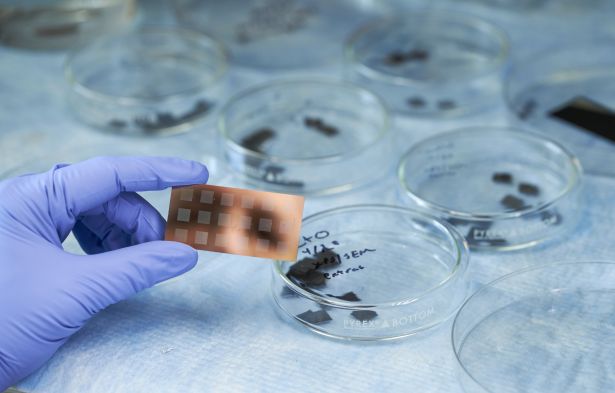- About
- Organization
- Organization Overview
- Dean’s Office
- Department of Bioengineering and Therapeutic Sciences
- Department of Clinical Pharmacy
- Department of Pharmaceutical Chemistry
- Quantitative Biosciences Institute
- Org Chart
- Research
- Education
- Patient Care
- People
- News
- Events
The Kidney Project earns KidneyX award to make home dialysis better for patients
Project will bring a key component of the implantable artificial kidney sooner to patients
By Levi Gadye and Nicholas Weiler / Thu May 2, 2019

Shuvo Roy, PhD, earned an award from KidneyX that will fund the development of an easy-to-use home dialysis system for kidney disease patients.
A team of researchers from UC San Francisco, Vanderbilt University Medical School (VUMC), and Silicon Kidney are among the winners of the “KidneyX: Redesign Dialysis” prize competition for their design of an innovative, implantable hemofilter dialysis system that would enable patients to safely and effectively treat kidney failure at home.
KidneyX, a public–private partnership between the U.S. Department of Health and Human Services (HHS) and the American Society of Nephrology (ASN), was founded to “accelerate innovation in the prevention, diagnosis, and treatment of kidney diseases.”
As one of 15 inaugural winners of the KidneyX Redesign Dialysis Phase I competition, announced April 29, 2019 in Washington DC, a team led by UCSF’s Shuvo Roy, PhD, and VUMC nephrologist William Fissell, MD, will receive $75,000 to accelerate the development of their proposed implantable dialysis device. More importantly, they will work closely with leadership of the U.S. Food and Drug Administration (FDA), Medicare, and HHS to accelerate the translation of their concept into a patient-ready device. KidneyX will award $500,000 to three teams as part of Phase II of the competition in the spring of 2020.
Roy is a faculty member in the Department of Bioengineering and Therapeutic Sciences, a joint department of the Schools of Pharmacy and Medicine, and a member of UCSF’s new Health Innovation via Engineering (HIVE) program.
Hemodialysis is the current standard of care for patients with kidney failure enduring the long wait for rare kidney transplants, but the half-century-old technique, which is in most cases fully covered by Medicare, is both inefficient and increasingly expensive. In 2016, there were estimated to be half a million people on dialysis in the United States, and the number of dialysis patients has been increasing steadily by about 5 percent a year.
The launch of KidneyX in part reflects efforts by UCSF and ASN to increase awareness among policymakers and legislators about the growing prevalence of kidney failure and the rising costs of treatment—estimated at about 7 percent of Medicare’s annual budget.
“It is wonderful to finally see a groundswell of understanding that we must develop better technological and medical solutions for dialysis patients. I hope this is just the beginning,” said Roy, a faculty member in the Department of Bioengineering and Therapeutic Sciences, a joint department of the UCSF Schools of Pharmacy and Medicine, and a member of UCSF’s new Health Innovation via Engineering (HIVE) program.
For the past decade, Roy and Fissell have been working on a fully-functional implantable bioartificial kidney that would eliminate the need for dialysis through an initiative called The Kidney Project. The researchers are close to beginning initial clinical trials to test the safety of components of the artificial kidney, but the fully functioning device is still some years away from being approved for clinical use.
For the Redesign Dialysis Phase I competition, researchers were asked to design solutions that “replicate normal kidney functions and improve patient quality of life,” and the Kidney Project team realized that the existing “hemofilter” unit of their artificial kidney fit that bill, and could be adapted to improve dialysis for patients while testing on the full artificial kidney continues.

An example of the silicon membranes, derived from The Kidney Project’s bioartificial kidney, that will be used in the iHemo filter unit.
The proposed system, known as iHemo (for implantable hemodialysis), would use the artificial kidney’s hemofilter to create a permanent interface between a patient’s circulatory system and a catheter that can be connected to an external pump, with the purpose of filtering out blood toxins. The system will spare patients from needles and time-consuming trips to dialysis centers.
“Home dialysis has many advantages, but patients are put off by the complexity of the equipment and the fear of needles and accidental bleeding,” Fissell said. “We’re going to provide the ability for patients to perform their own dialysis sessions at home at their convenience according to their schedules. By eliminating the blood and the needles and substituting a simple connector to a drain bag, we get past the fear factor and reduce the footprint of the machinery.”
The KidneyX award represents a key stepping stone on the way to the Kidney Project’s ultimate goal of a fully-realized, implantable artificial kidney, according to Roy.
“The award will not only provide further fuel for The Kidney Project but will also bring our advances to patients while the fully implantable artificial kidney is still being developed,” he said. “We are very grateful for this validation from a jury of policymakers, patients, scientists, and the biomedical industry.”
More
Tags
Keywords:
Sites:
School of Pharmacy, Department of Bioengineering and Therapeutic Sciences, PharmD Degree Program
About the School: The UCSF School of Pharmacy aims to solve the most pressing health care problems and strives to ensure that each patient receives the safest, most effective treatments. Our discoveries seed the development of novel therapies, and our researchers consistently lead the nation in NIH funding. The School’s doctor of pharmacy (PharmD) degree program, with its unique emphasis on scientific thinking, prepares students to be critical thinkers and leaders in their field.




